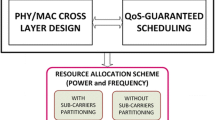Abstract
A cross-layer scheduling and resource allocation (SRA) strategy for an adaptive modulation and coding (AMC) based orthogonal frequency multiple access (OFDMA) system is proposed. The objective of this paper is to maximize the system throughput as a function of the bit error rate (BER) and the spectral efficiency based on the selected modulation and coding schemes (MCSs). The proposed strategy contains two main algorithms. Firstly, the scheduling algorithm that aims to maximize the average system throughput by arranging the users in distinct queues according to their priorities and selecting the best user of each queue individually in order to guarantee a fair user service amongst different priority levels. Secondly, the resource allocation algorithm that allocates the user, bit and power based on the channel conditions of the scheduling users and the transmission power constraints. The transmitter of the investigated AMC-OFDMA system at the assigned base station (BS) divides the transmitted OFDMA frame into sub-channels and assigns each sub-channel to a scheduled user. In this paper, we compare the performance of the proposed SRA with the conventional first in first out (FIFO) queuing based scheduling and resource allocation strategies used for an AMC-OFDMA system. The simulation results show that the investigated AMC-OFDMA system based on the proposed SRA strategy outperforms the conventional approaches.







Similar content being viewed by others
References
M. Al-Janabi, C. Tsimenidis, B. Sharif, and S. Le Goff, Optimal User scheduling and resource allocation strategy for AMC based OFDMA systems. PIMRC 2010 Conference, pp. 1298–1302, 2010.
Y. Zhang and H-H. Chen, Mobile WiMAX: Toward Broadband Wireless Metropolitan Area Networks. Book News Inc., Portland, OR, 2008.
L. Nuaymi, WiMAX Technology for Broadband Wireless Access, John Willey and Sons, Ltd, England, 2007.
D. Tse, Fundamentals of Wireless Communications. University of California, Berkeley, 2004.
R. van Nee and R. Prasad, OFDM for Wireless Multimedia Communications. Artech House, 2000.
A. L. Intini, Orthogonal Frequency Division Multiplexing for Wireless Networks, University of California, Santa Barbara, 2000.
H. Schulze and Ch. Luders, Theory and Applications of OFDM and CDMA Wideband Wireless Communications, John Wiley and Sons Ltd, Chichester, 2005.
U. Madhow, Fundamentals of Digital Communication, University Press, Cambridge, 2004.
K.Song, A. Ekbal, S. Chung, and J. Cioffi, Adaptive modulation and coding (AMC) for bit-interleaved coded OFDM (BICM-OFDM). IEEE Transactions on Wireless Communications, Vol. 5, No. 7, pp. 1649–1655, 2006.
W. Huang and K. Letaief, A cross-layer resource allocation and scheduling for multiuser space-time block coded MIMO/OFDM systems. ICC 2005 Conference, pp. 2655–2659.
K. Seong, R. Narasimhan, and J. Cioffi, Queue proportional scheduling via geometric programming in fading broadcasting channels, IEEE Journal on Selected Areas in Communications , Vol. 24, No. 8, pp. 1593–1602, 2006.
M. Ergen, S. Coleri, and P. Varaiya, QoS aware adaptive resource allocation techniques for fair scheduling in OFDMA based broadbanding wireless access systems, IEEE Transactions on Broadcasting, Vol. 49, No. 4, pp. 362–370, 2009.
Z. Kong, Y. Kwok, and J. Wang, A low-complexity QoS-aware proportional fair multicarrier scheduling algorithm for OFDM systems, IEEE Transactions on Vehicular Technology, Vol. 58, No. 5, pp. 2769–2782, 2009.
H. Seo and B. Lee, Proportional-fair power allocation with CDF-based scheduling for fair and efficient multiuser OFDM systems, IEEE Transactions on Wireless Communications, Vol. 5, No. 5, pp. 978–983, 2006.
J. Huang, V. Subramanian, R. Agrawal, and R. Berry, Downlink scheduling and resource allocation for OFDM systems. IEEE Transactions on Wireless Communications, Vol. 8, No. 1, pp. 288–296, 2009.
R. Elliott and W. Krzymien, Downlink scheduling via genetic algorithms for multiuser single-carrier and multicarrier MIMO systems with dirty paper coding, IEEE Transactions on Vehicular Technology, Vol. 58, No. 7, pp. 3247–3262, 2009.
S. Nam, H. Yang, M. Alouini, and K. Qaraqe, Performance evaluation of threshold-based power allocation algorithms for down-link switched-based parallel scheduling, IEEE Transactions on Wireless Communications, Vol. 8, No. 4, pp. 1744–1753, 2009.
J. Huang, V. Subramanian, R. Agrawal and R. Berry, Joint scheduling and resource allocation in uplink OFDM systems for broadband wireless access networks, IEEE Journal on Selected Areas in Communications, Vol. 27, No. 2, pp. 943–947, 2009.
Guidelines for the evaluation of radio transmission technologies for IMT-2000, Recommendation ITU-R M.1225, 1997.
J. G. Proakis and M. Salehi, Digital Communication, 5th edn. McGraw-Hill, New York, USA, 2008.
M. Al-Janabi, C. Tsimenidis, B. Sharif and S. Le Goff, Adaptive MCS selection in OFDM systems based on channel frequency coherence, AICT 2009 Conference, pp. 177–182.
B. Devillers, J. Louveaux, and L. Vandendorpe, Bit and power allocation for goodput optimization in coded parallel subchannels with ARQ, IEEE Transactions on Signal Processing , Vol. 56, No. 8, pp. 3652–3661, 2008.
I. Stupia, L. Vandendorpe, J. Louveaux, F. Giannetti, V. Lottici, and N.A. D’Andrea, Power allocation for goodput optimization in BICM-OFDM systems, ICC 2008, pp. 3604–3608.
R. Duran, J. Louveaux, and L. Vandendorpe, Goodput optimized bit and power allocation for OFDM transmission with relaying, ISSPIT 2007, pp. 1116–1120.
C. Snow, L. Lampe, and R. Schober, Error rate analysis for coded multicarrier systems over quasi-static fading channels, IEEE Transactions on Communications, Vol. 55, No. 9, pp. 1736–1746, 2007.
T. Moon, Error Correction Coding, Mathematical Methods and Algorithms, John Wiley and sons, INC., Canada, 2005.
Author information
Authors and Affiliations
Corresponding author
Rights and permissions
About this article
Cite this article
Al-Janabi, M.S., Tsimenidis, C.C., Sharif, B.S. et al. Scheduling and Resource Allocation Strategy for OFDMA Systems Over Time-Varying Channels. Int J Wireless Inf Networks 18, 119–130 (2011). https://doi.org/10.1007/s10776-011-0158-9
Received:
Accepted:
Published:
Issue Date:
DOI: https://doi.org/10.1007/s10776-011-0158-9




